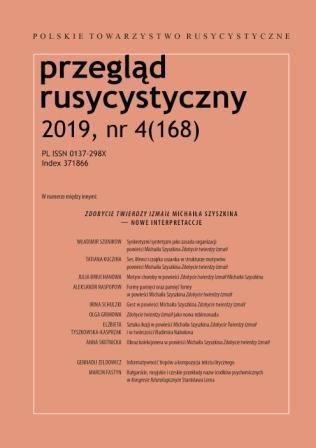Искусство иллюзии в романе Михаила Шишкина Взятие Измаила и в творчестве Владимира Набокова
The art of illusion in Mikhail Shishkin’s novel The Taking of Izmail and in the oeuvre of Vladimir Nabokov
Author(s): Elzbieta Tyszkowska-KasprzakSubject(s): Novel, Comparative Study of Literature, Russian Literature, Theory of Literature, Sociology of Literature
Published by: Polskie Towarzystwo Rusycytyczne
Keywords: Mikhail Shishkin; Vladimir Nabokov; illusion; illusionist; circus;
Summary/Abstract: The illusionist in both Mikhail Shishkin’s novel The Taking of Izmail and in Vladimir Nabokov works appears in reference to the Platonic tradition, in the context of creative efforts, which, in turn, are associated with the divine creation of the world (the Creator — illusionist — writer triad). Therefore, the character of the magus often functions as a metaphor of the author of the text: he also has the ability to create something out of nothing; he can make something disappear or undergo transformations. Both Shishkin and Nabokov (e.g. in King, Queen, Knave, and Pale Fire) compare the creation of literary worlds to the art of illusion, which is especially associated with the origin of the universe in contemporary prose writers. An important motif related to the art of illusion is the disappearance/death of heroes (The Potato Elf, and The Luzhin Defense by Nabokov), which has its roots in the tradition of Russian literature and is connected with emphasizing the role of the author of the text as the driving force for the development of the story.
Journal: Przegląd Rusycystyczny
- Issue Year: 2019
- Issue No: 168
- Page Range: 95-111
- Page Count: 17
- Language: Russian

